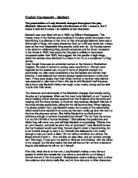English Coursework – Macbeth
The presentation of Lady Macbeth changes throughout the play Macbeth. Discuss the dramatic effectiveness of Act 1 scene 5, Act 2 scene 2 and Act 5 scene 1 in relation to her character.
Macbeth was most likely written in 1606, by William Shakespeare. This means many of the themes and storylines in the play would have been more hard-hitting to audiences at that time. At this time people believed there was a divine right of kings, who were chosen by God, so to kill one would have been seen as the most despicable thing anyone could ever do. As the play seems to be aimed at celebrating King James's ancestors and the Stuart accession to the throne in 1603, they argue that the play is unlikely to have been composed earlier than 1603; and suggest that the parade of eight kings, which the witches show Macbeth in a vision in Act IV, is a compliment to King James.
Even though there was an unmarried woman at the throne in Elizabethan England, the roles of women in society were very limited. Women were regarded as the weaker sex, not just in terms of physical strength, but emotionally too. Men were considered to be the leaders and women their inferiors. It was believed that women always needed someone to look after them. If they were single, then their father, brother or another male relative was expected to take care of them; this ties in with Macbeth itself because this is how Lady Macbeth thinks men ought to be, manly, strong and be able to look after their wives.
The character and relationship of the Macbeths changes dramatically during the play as it progresses. When we first meet Lady Macbeth, in act 1 scene 5, she is reading a letter she has received from her husband after his battle and meeting with the three witches. In the letter she receives, Macbeth tells her of the three witches predictions; telling him he will become king. When replying, it is clearly evident that Lady Macbeth wears the trousers in the relationship, which would have resulted in an outcry as this went totally against the norm at the time this play was written. She thinks Macbeth is too kind and not ambitious enough to enforce the predictions himself. “Yet do I fear thy nature, it is too full o’th’milk of human kindness.” She believes the predictions and thinks they will come true, and will help Macbeth in succeeding. “Glamis thou art, and Cawdor, and shalt be what thou art promised.” Lady Macbeth knows that her husband would want King Duncan dead in order to become king, but is not forceful enough to carry it out himself; she believes he I not manly enough to carry out such a deed. “Art not without ambition, but without the illness should attend it… thou wouldst not play false, and yet wouldst wrongly win.” She says, “I may pour my spirits in thine ear and chastise with the valour of my tongue”, by this she means that she will instruct him on how to become king as she believes he will not do it himself.







